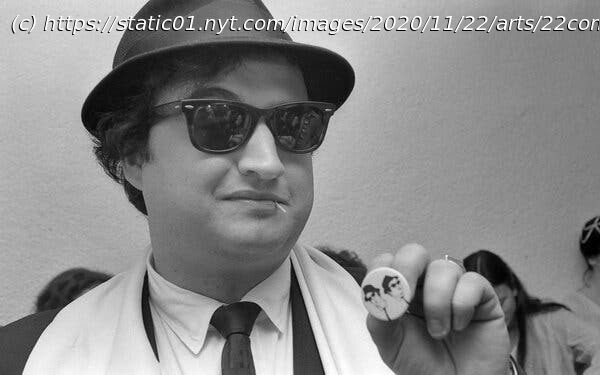After Bob Woodward’s “Wired” focused too much on the comic’s death, this documentary looks fondly at the star’s life. But his comic genius deserves more.
In his brief six years on the national stage, no comic was more popular than John Belushi. At the height of his fame, in the late 1970s, he eclipsed even Steve Martin and Robin Williams by starring in the top-rated new phenomenon, “Saturday Night Live” and what was then the highest grossing film comedy ever, “Animal House,” while his band, the Blues Brothers, had the country’s No.1 album, “Briefcase Full of Blues.” And yet, the wild successes of his life have still been partly overshadowed by his shockingly abrupt death, of a drug overdose at the age of 33 in 1982. Two years later, Bob Woodward took a rare foray outside politics to release a book about Belushi, “Wired,” an oddly clinical, coldly lurid best seller that focused on the star’s debauched final days. It reads like a series of “Behind the Music” episodes transcribed by an accountant. That controversial book still looms over Belushi’s legacy, and while there have been several attempts to fill out his story, including a memoir by his widow that fixates on Woodward, a new movie by the documentary veteran R.J. Cutler (“The September Issue”) is the first portrait that vividly humanizes Belushi while remaining cleareyed. The key to the film, “Belushi” (debuting Sunday on Showtime), is its primary sources. In documentaries, they can be the difference between textbook history and gripping drama. Cutler lavishes attention on private photos, childhood videos, old interviews, but most of all, Belushi’s letters, presenting a figure much more introspective and sensitive than the frat-boy icon Bluto from “Animal House,” his most famous character. Cutler doesn’t look back so much as try to tell Belushi’s story in a present tense. This has drawbacks, including a missing critical voice to contextualize and explain the star’s aesthetic. But amid a glut of fawning comedy documentaries, Cutler’s movie stands out as balanced, illuminating and compulsively watchable. On television, Belushi appeared to be a blue collar Everyman who “represented messy bedrooms all over America,” as Steven Spielberg, who cast him in “1941,” once described him. But Belushi was also driven and ambitious, the kind of guy who kept his good reviews in his pocket, alert to artistic credibility.






